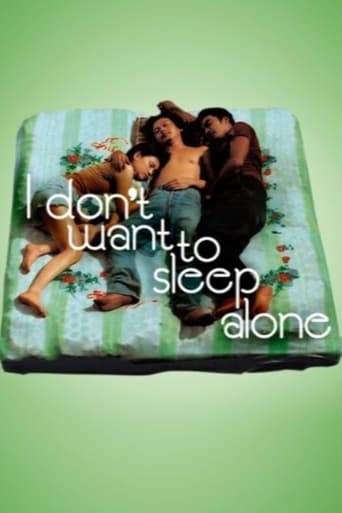

This Chinese Taiwanese film is depicting the life of young people in Kuala Lumpur in Malaysia. It is showing one of these tigers of Asia in their development at a crucial moment when things seem to be halted and yet they go on maybe just at a slower pace. But people remain what they are, people with human values. They will help a man who had fainted on the sidewalk. They will wash him, feed him, take care of him just as if he was one of the family, though he is unknown. They will take care of a man who is absolutely reduced to a vegetable state, unresponsive, and yet there, alive even if totally blank. And then the impulses of the women or of the men are the same as everywhere in the world, and yet what these young people really want is not that instantaneous and future-less of not futile moment of bliss. They want to be close to someone else, feeling his or her heart and blood pressure and emotions and sentiments and heat, share that feeling and just sleep into it, dream into it. Let's go beyond this world of imperfection and never satisfied failure or success, it does not matter. Let's get into the deep mellowness of empathy, sympathy, compassion, sharing and gathering our minds and all our senses into some kind of communion that is one step closer to the path to enlightenment. That's what at least the Buddha in the café tells me, though we see him from the back and Buddhism is only second to Islam in Malaysia, but the two religions have that thing in common that the mind and the heart are only one same thing and they are the only guides that can take us to a higher more humane level of humanity. And that is all contained in that big mattress they find on the sidewalk and they transport together from one place to another with only one intention, to share it, to use it together. A mattress as a symbol of the Buddhist Dukkha, that never ending cycle from birth to rebirth and every time some people abandon the mattress, it dies, but then some other people come and give it a new life through a rebirth of love.Dr Jacques COULARDEAU, University Paris Dauphine, University Paris 1 Pantheon Sorbonne & University Versailles Saint Quentin en Yvelines
... View MoreHonestly, I can't bring myself to like this movie, though I've to admit that the cinematography is gorgeous, and Lee Kang-sheng was very believable as the brain-dead patient. Many of the long, static scenes, especially the ones with the dark pool and the brain-dead patient with his urine bag, are completely pointless, and the scene with the lady boss masturbating the brain- dead man with Chen Xiang-chyi's hand filled me with disgust. I know it is a film that can't be judged by normal standards, but what's disgusting is disgusting, whether it's in the name of art or whatever. I really don't understand what kind of message Tsai Ming-liang was trying to convey in many of the scenes, and I doubt whether he himself knew what he was doing. Most of the time it just seems like a hodgepodge of random (and meaningless) ideas pieced together. OK, it's made by an auteur and it's supposed (or I should say, normal?) to be so, but it's definitely not what we called good story-telling. The relationships depicted here are so unclear (there's nothing apart from lust), and I find the characters (except the one played by Norman Atun) hard to sympathize with. The healthy Lee Kang-sheng was a dreadful hypocrite (not to mention being an ungrateful bastard), and the other two women are just soulless, sexually dissatisfied characters that afford some erotic excitement in the movie.
... View MoreWhen I left the theater two nights ago after seeing I Don't Want To Sleep Alone, a woman exiting with a friend in front of me turned to her companion and said "I'm so sorry, I thought it would be good"....but to me it was good, if not excellent. This movie is really such a great example of how film can define one's aesthetics. You like slow movies or you don't. You like people wearing plastic trash bags over their mouths while attempting love-making or you don't. You like subtle expressions of desire or you don't. Tsai's films let you do the exploration, instead of having a tour-guide with a megaphone pointing out the most important highlights of the experience.Funny, a few years ago when I saw Lost In Translation a similar thing happened. A young couple leaving the theater talked about how nothing happened in that movie and how boring it was. At precisely the same time I was thinking how moving the film had been to me.See the film--you might find it boring but I would be surprised if you don't think about it a lot more after viewing it than almost any Hollywood blockbuster.
... View MorePusan Film Festival Reviews 7: I Don't Want to Sleep Alone (Tsai Ming-liang) I haven't seen Tsai's last film, "The Wayward Cloud," but I'm happy to report that "I Don't Want to Sleep Alone" is better than his appallingly dull and pretentious "Goodbye, Dragon Inn," even if it's got nothing on Tsai's best work of the '90s, "Vive L'amour" and "The Hole." "Goodbye, Dragon Inn" represented the mummification of Tsai's style - the stretches of silence and static scenes where nothing happens, which had served him so well in his early career but with each passing film threatened to get old, finally found their ultimate negative expression. Tsai continues to grind his wheels with the new film, though it's hardly as unbearable as "Goodbye, Dragon Inn." The problem is that Tsai's style was something of a revelation when he made "Vive L'amour" - though it felt a little like a Taiwanese version of an Antonioni film it was actually a deadpan comedy, with a wickedly tragic twist at the end that turned like a knife you didn't even realize was stuck in your ribs all the while. I hoped that a change of scenery might do Tsai good, and it was interesting to hear that "I Don't Want to Sleep Alone" was shot in Malaysia, where Tsai was born. I wanted to ask him some questions after the screening about the differences he may have felt shooting in Malaysia, but unfortunately, like the Bruno Dumont session, questions were asked in Korean translated to the director's native language, and I don't speak much Korean, French or Chinese. No one speaks much in Tsai's new film (of the three main characters only one is ever heard to utter a word), there are frank and disturbing sexual scenes, and there are several shots of people walking slowly down darkened corridors or alleyways. All this has become a mannerism - rather than communicate incommunicability the lack of dialogue feels like an art film pretension now, rather than be shocking the sexual scenes strike anyone familiar with the director's past work as been-there-done-that, and the long static shots of people walking just serve no purpose whatsoever. Unfortunately much of Tsai Ming-liang's new film feels stale.
... View More